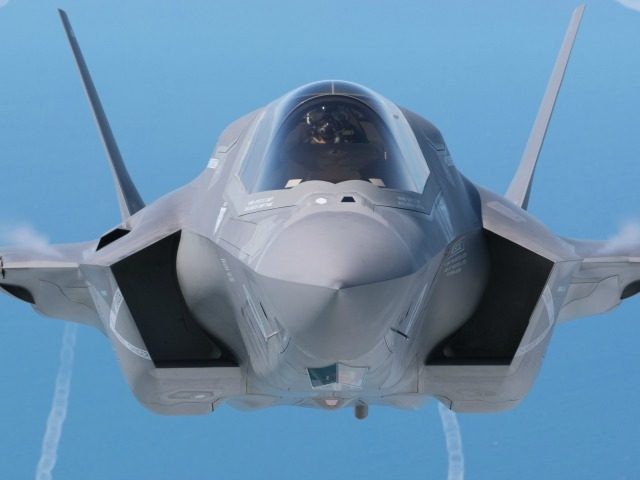Senators John Cornyn (R-TX) and James Inhofe (R-OK) on Monday wrote a letter to President Donald Trump urging him to consider the sale of F-35B fighter jets to Taiwan, citing China’s growing military capabilities and increasing belligerence toward the island.
Critics of the idea warn that F-35B sales could make America’s diplomatic situation with China much worse and could jeopardize American national security by putting some of our most advanced technology within reach of Chinese spies.
“After years of military modernization, China shows the ability to wage war against Taiwan for the first time since the 1950’s,” the senators warned President Trump in their letter.
“However, with your leadership, it is possible to help Taiwan remain a democracy, free to establish a relationship with China that is not driven by military coercion,” they continued. “Taiwan has a legitimate requirement to field a modern fighter fleet to address a myriad of defense contingencies. Therefore, Taiwan is requesting U.S. support in their procurement of the F-35B.”
Cornyn and Inhofe argued that Taiwan’s aging force of F-16s is no longer sufficient to provide a slam-dunk defense against China’s increasingly sophisticated air and naval forces. In particular, they cited the vertical take-off and landing (VTOL) capability of the F-35B and its advanced sensor suite as ideal deterrents against Chinese missiles. VTOL capability is a strong selling point given that a Chinese attack would almost certainly begin with strikes on Taiwan’s airfields.
The senators argued that allowing Taiwan’s air defenses to degenerate would “be destabilizing and would encourage Chinese aggression to ensue.” They also worried about the burden placed on forward-deployed U.S. assets in Northeast Asia to take up the slack in Taiwan’s defenses.
“Taiwan is rightly criticized for not investing enough in its own self-defense. However, we can make a significant impact on our longstanding commitment by partnering with Taiwan to provide replacement fighters that positively impact force modernization efforts,” Cornyn and Inhofe concluded. As a fallback position, they asked President Trump to consider increased sales of F-16V fighters to Taiwan if he does not approve the F-35B.
Taiwan’s Defense Minister Yen Teh-fa reaffirmed Taiwan’s interest in acquiring F-35s in remarks to his parliament on March 15. Japan and South Korea have both ordered a substantial number of F-35 variants, and are investigating options for launching the F-35 from their naval vessels.
Defense One quoted analysts who were skeptical of the F-35 idea on Monday, including Richard Aboulafia of the Teal Group, who wondered if Taiwan would be able to afford the high cost of maintaining the F-35 in sufficient numbers to provide a real deterrent against China.
Retired fighter pilot John “JV” Venable, now a Heritage Foundation analyst, worried about “upping the ante significantly not just between the Taiwanese and Chinese, but between the United States and China” by selling more sophisticated weapons to Taiwan.
Venable also pointed out that the F-35 requires advanced support technology, including a powerful computer network, that could be dangerously exposed to Chinese espionage by selling it to Taiwan. This was one reason he thought selling newer-model F-16s or F/A-18s to Taiwan would be preferable to selling them F-35s.
Reuters offered a peek on Tuesday at just how confident and aggressive Chinese rhetoric toward Taiwan has become:
On Tuesday, retired Chinese general Wang Hongguang explained how easy it would be for China to attack Taiwan in an opinion piece in widely read state-run newspaper the Global Times, including a mass bombardment which would render Taiwan’s military inoperable within 48 hours.
Taiwan’s main command center outside Taipei is also clearly marked out on Google maps, Wang, a former deputy commander of the Nanjing military region, wrote.
“It would be like picking off lice on the head of bald man,” Wang added.
Chinese officials simultaneously labored to give Taiwan a way out by constructing a scenario in which “certain Americans” are “duping Taiwan compatriots” into a conflict with China that would only benefit Americas, as Liu Jieyi of China’s Taiwan Affairs Office put it.
From this perspective, a move as dramatic as Taiwan purchasing F-35s would make it much more difficult for the Chinese to pretend that cooler heads in Taipei could prevail at any moment and steer the island back into the welcoming embrace of its big brother on the mainland.

COMMENTS
Please let us know if you're having issues with commenting.